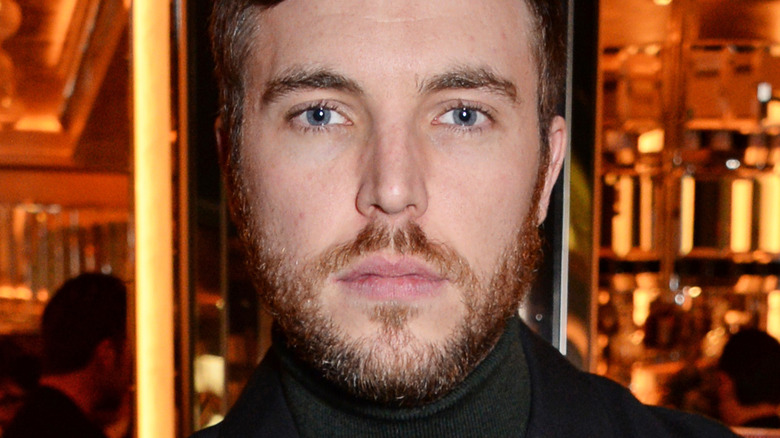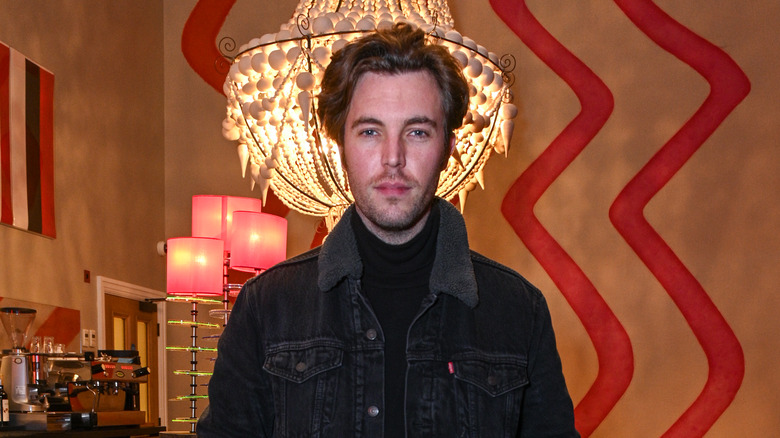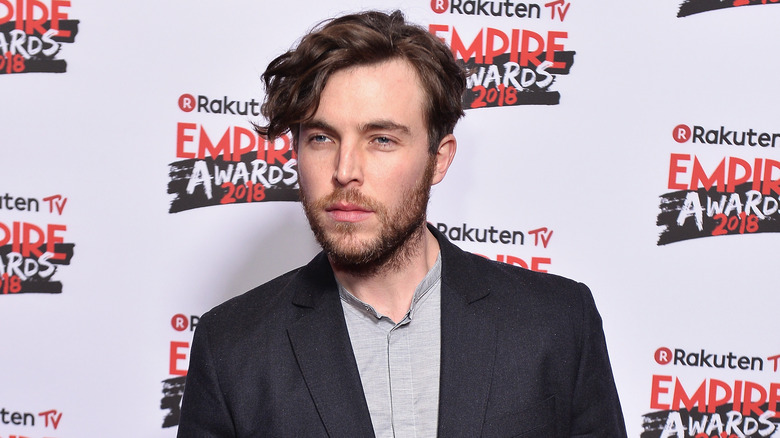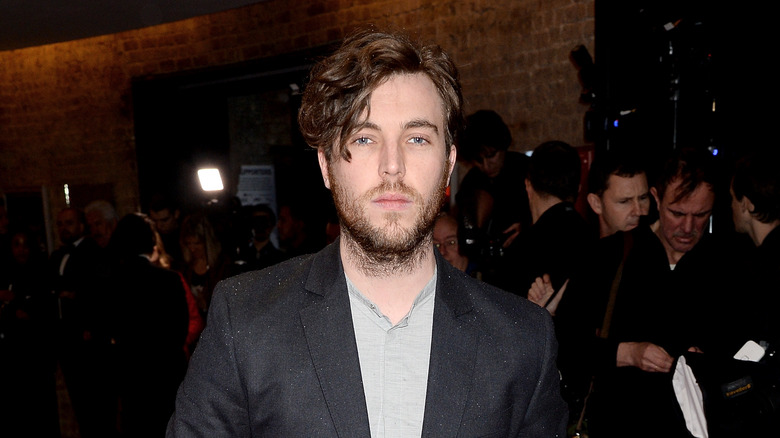Actor Tom Hughes Dishes About His New Movie Shepherd, The Horror Film Genre, And More - Exclusive Interview
Raise your hand if you've felt as though the last two years of COVID have been a bit like living through a horror film. We're right there with you, and ahead of his skin-crawling film, "Shepherd," dropping in theaters May 6, actor Tom Hughes is the perfect person to weigh in on the topic.
Hughes, of course, is the charming British actor known for his roles in projects such as "Victoria," "Red Joan," and "Cemetery Junction," but his foray into the horror genre has taken shape as "Shepherd," the chill-inducing thriller that follows his character Eric Black's descent into nothing short of paranoia. To say that the film is an intimate portrait of a man's battle with internal and external demons is right on the nose, and Black's isolation and faltering mental acuity is incredibly gripping. To get better insight into just how demanding the role was, Nicki Swift sat down with Hughes himself for an exclusive interview, where he chatted about the film's challenging dynamic, production, and more.
Hughes, in person, doesn't strike you as someone who would bring such dark, deeply disturbing performance to the screen. A self-described social butterfly who went to great lengths to prepare for the role, Hughes was not only a delight to chat with, but the actor gave us insights into the movie that only he could.
Tom Hughes was attracted to the 'honesty' in the film Shepherd
We have to discuss the movie, the twists, the turns. The personal strife your character goes through is pretty profound. Before we get into the nitty gritty of it, I'd love to know what initially attracted you to the project.
Everything you just said. I think. I was on holiday actually when I read the script for the first time. It was a very different world to where I was at, but I was completely drawn into it and immersed in it. I also felt like, obviously [character Eric Black] is going on a transition through the film that is, I felt like I'd been mapped out. I didn't know [Director Russell Owen], previously at all. Reading it, I felt like there was a delicacy and an honesty, and a bravery about how that had been mapped out in the script. I'm not necessarily per se your biggest go-to for kind of advice on horror movies. It's not really a genre that I'm necessarily drawn to.
For me, there really was a bit of a thrill of having this social realism at the heart of a horror film. Also, just having the story of a character that I just felt, I felt very empathetic towards Eric. I wanted to bring his story to life. It really, the residue of having lived in his shoes for that hour and a half reading script really stayed with me. When I came back from holiday, I was determined to do it. Went and met Russell and he was great. Three weeks later we were on an island off the coast of Scotland and –
Wow.
– that was it.
The actor dug deep in order to convey the emotional complexity to the audience
How you described it, it sounds to me like just that amazing novel that you pick up and absolutely can't put down — really immersing yourself in the character development. I'd love to know kind of how that challenged you creatively from the onset?
I mean, there's obviously the usual challenges of playing a character. I think what, whoever that character may be, I think there's a responsibility as an actor and to obviously try and make that tangible, kind of reachable. And as emotionally visceral and complex and as open as you can, that's kind of a thrill of my job. But there was another, there was this added layer of, it's only me. I mean, I know Kate Dickie comes in, Greta [Scacchi] comes in, Gaia [Weiss] comes in. When they arrived, it was like the sun was shining on the island.
Right.
But for the most part, for 90%, it was just me on my own trying to convey this story. From a technical perspective, that was a challenge as well. That took a bit of getting used to on all levels, because you realize all the complexity that you would want to show. All of the sensitivity of that portrayal that you would wish to put in there, you're having to pass that to an audience through gestures, breaths, internal thought. Actually, not really gestures and breath. It is those things that manifests as those things, but actually you're just there trying to relive it as honestly, and as for real as you can. You just have to trust that the audience is going to reach you and –
Right.
– actually, therefore it was very hard to watch it back. I spent the whole time going, "Oh no, it's too subtle." That was a thrill. It was a challenge. It was slightly discombobulating. I was delighted to take that challenge on. I'm aware not every actor gets the opportunity to try and tell that story on your own. I was – I felt very lucky to have that.
Tom Hughes didn't have a lot of time to prepare for such a challenging role
Well, we see your character just really dive into this paranoia really. That's such an evocative journey, I think, to try to convey. I'd love to know where you sourced inspiration to really prepare for this kind of decline into chaos.
Well, I mean, listen, for every part you do research, and there'd be people that I would kind of ask questions of. And try and understand how physically things like that would manifest, because fundamentally a lot of the communication with the audience, the thing they're going to be able to reach, is the physicality of the character. I didn't have a lot of time. I literally had about three weeks. Therefore, a lot of it came down to once you kind of had those touch points. When I was there, a lot of it, you go back to the script, obviously. Russell was great. Eric is not Russell, and Russell is not Eric, but I think in the writing of the story — I know Russell's mentioned this, so I don't think he'd mind me mentioning it — I think there's certain things that he might have put in there, that perhaps resonated with him on some level or he could reference. That was a very important thing to get right.
But also, if I'm really honest, the real thing that got me was trying to put my body through as much as I could, what I felt Eric's body would be going through. I had moved myself to a hotel that was miles away from the crew, and it was only me staying there –
Wow.
– on the island. Tried to live that isolation as much as I could to see how that would affect you. I'm very social normally, so obviously that's going to have an impact. And then nature, if I'm honest. I tried to just immerse myself in the power of nature on this island. Actually, if you are someone trying to find your identity, if you feel like you've lost yourself, which Eric certainly does. Actually, if you try and find your reflection in nature, there's something, nature is the most wonderfully uplifting thing, but it can also be quite oppressive.
Absolutely.
That isolation, the power of being in nature as well, really informed the rhythm of Eric, I think.
What does Tom Hughes want audiences to take away from Shepherd?
With all of that said, I'd love to know two things. What you would say your biggest takeaway from the film was, and what you would like audiences to walk away with?
My biggest takeaway on the film is, don't shoot a film on the Isle of Mull in February. The weather was hard. For the audience, listen, it's got horror elements, there's shock elements. I hope people get excited by that. But, I also, I think, I hope there's also something quite profound to be felt in stepping into Eric's shoes. If we've done this right, and told this story right, I actually think if people can feel the empathy towards him that I felt, then hopefully that's half the job done. For me, it is kind of, I think, any good film, any good book, any good piece of music, anything like that. Any good art gallery, you walk out and you look at life slightly differently. I would just hope that having lived in Eric's shoes, it can just stay with people enough just to let them, just take another angle at life in general, whatever that may be.
Right. I think, especially, I couldn't help but draw some kind of comparison to the pandemic. And the isolating nature of not only what your character goes through, but also so many people who have also spent so much time with themselves. So much more than they probably ever anticipated.
Very much. I mean, we shot it three years ago, which was just before the pandemic, but I'm a social creature. I have to say time spent in any kind of isolation in the pandemic, it wasn't something that I was keen on. It certainly didn't sit well with me. It's not what I would reach for normally. That would've impacted so many people in different ways. I'm sure there will be an element of resonance with that. But this is Eric's story. Everyone will have their own view of it, but there's something about seeing, because he's on the island, because there's no one around, he's open. Hopefully that just resonates with people. Hopefully people can, I don't know. I just hope they enjoy living in his world for a second. Even though it's a world that, at the time we meet him, is perhaps not the one with the most optimism.
Definitely. All right, well I'm going to let you go, but this was great. Thank you so much.
"Shepherd" will be in theaters on May 6 and available On Demand and Digital on May 10.
This interview has been edited for clarity.





